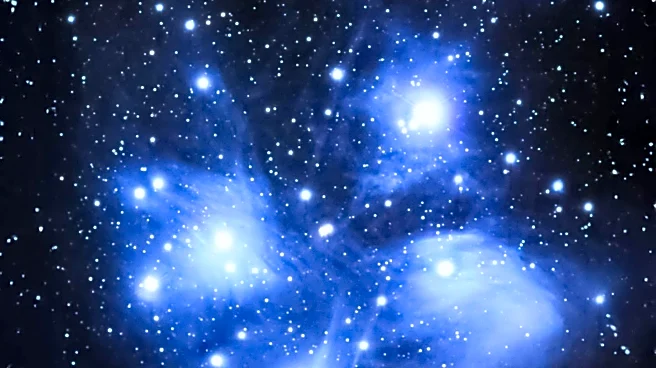What's Happening?
Astronomy Magazine has provided guidance for observing the open cluster M103 in the constellation Cassiopeia, known as the Queen. M103 is a young open cluster of stars, identifiable at magnitude 7.4, located
1° northeast of Delta Cas. The cluster spans approximately 6' in angular diameter and contains several dozen bright stars. It is positioned between 8,000 and 9,000 light-years from Earth and is estimated to be between 9 and 25 million years old. A prominent central red giant is a notable feature of M103. The magazine also notes a celestial event involving Titan's transit across Saturn on November 6, 2025. Astronomical ephemerides for November 6 include sunrise at 6:36 A.M., sunset at 4:50 P.M., moonrise at 6:22 P.M., and moonset at 9:29 A.M., with a 90% waning gibbous moon phase specified for 40° N 90° W.
Why It's Important?
Observing celestial events like the open cluster M103 provides valuable opportunities for amateur astronomers and enthusiasts to engage with the night sky. Such events can enhance public interest in astronomy and science education, fostering a deeper understanding of the universe. The visibility of M103 and the transit of Titan across Saturn offer unique observational experiences that can inspire curiosity and learning. These events also contribute to the broader scientific community's efforts to map and understand stellar formations and their characteristics, aiding in the study of star evolution and galactic structures.
What's Next?
Astronomy enthusiasts are encouraged to prepare for the upcoming celestial events by ensuring they have the necessary equipment, such as binoculars or small telescopes, to observe M103 and Titan's transit across Saturn. Observers should check local weather conditions to optimize viewing opportunities. Additionally, Astronomy Magazine's 'Sky This Week' column may provide further insights and updates on other celestial events occurring throughout November, allowing enthusiasts to plan their observations accordingly.
Beyond the Headlines
The observation of celestial events like M103 and Titan's transit can have cultural and educational impacts, promoting interest in space exploration and science. These events can serve as a catalyst for community gatherings, educational programs, and public outreach initiatives aimed at increasing awareness and appreciation of astronomy. Furthermore, they highlight the importance of preserving dark skies and reducing light pollution to ensure future generations can continue to enjoy and study the night sky.











